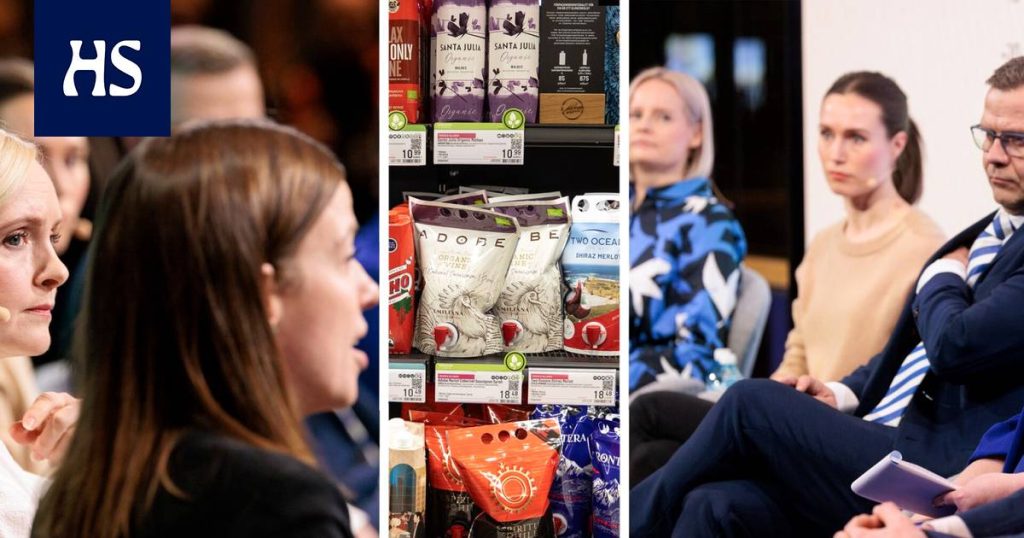
Kokoumus, the Greens and Liike Nyt would bring wines to grocery stores. A narrow majority of Finns support the sale of wine in grocery stores.
Attitude the liberalization of wine sales divides parliamentary parties and also the people.
Currently, wines can only be sold in Finland from Alko’s shelves, and wineries can also sell their own products.
Alko’s monopoly currently extends to the sale of all alcoholic beverages over 5.5%. The purpose of Monopoly is to reduce and prevent alcohol harm. Health organizations and, for example, the Norwegian Institute of Health and Welfare (THL) have demanded that Alko’s monopoly be maintained for reasons of public health.
According to the recent HS-gallup, a narrow majority of Finns, i.e. 53 percent, think that wines should be able to be sold in grocery stores as well. A good third, or 36 percent, say no to bringing wines to the grocery store, while 11 percent could not state their position.
In addition HS inquired about the position of the parliamentary parties on the subject with a separate e-mail survey. The Sdp, one of the largest parties in the parliament, would not allow the sale of wine in grocery stores. The party is of the opinion that Alko’s monopoly is one effective way to prevent alcohol harm in Finland.
Basic Finns do not have a direct position on the matter. In the party’s opinion, the dominance of the two large grocery store chains should be broken before one could think about breaking up Alko’s wine monopoly.
Instead the coalition is on the side of liberalizing the wine trade. If it were only up to the coalition, wine-fortified drinks would be on grocery store shelves during the upcoming election season. The coalition also supports allowing wine sales in restaurants.
The coalition is known to push for the abolition of the entire Alko monopoly.
Read more: Many now want wines in grocery stores, but this can have surprising consequences – HS met the world’s leading alcohol researcher, who has a warning message
The coalition is in the same position as the trade sector, represented by Päivittäistavarakauppa ry and the Trade Union, which are visibly lobbying for the liberalization of the wine trade. The non-governmental organizations are running the “Viinit ruokauppaaan” campaign.
According to THL, allowing the sale of wines in grocery stores would also destroy the monopoly covering spirits. Along with wines, the sale of practically all alcoholic beverages below 15% should be liberalized. If this were to happen, up to 75 percent of Alko’s sales would open up to competition, according to THL.
On this basis, the Left Alliance does not support the sale of wine in grocery stores. The party therefore believes that if wines were brought to grocery stores, the entire alcohol monopoly could be immediately thrown into the trash.
The center think that wines should not be brought to grocery store shelves. The party reminds that the alcohol law was reformed only in the previous election period.
The alcohol law that entered into force in 2018 raised the maximum alcohol content of drinks sold in grocery stores from 4.7 percent to 5.5 percent. At the same time, the restriction on the method of production was removed, so liquor-based lemonades made it to stores.
According to the Greens, wines could very well belong in grocery stores in Finland as well, because wine is a food beverage. In the party’s opinion, Finnish alcohol culture should be developed in a healthier direction anyway.
Among the smallest parliamentary parties, the Christian Democrats and Rkp would not bring wine to the grocery store. Instead, Liike Nyt dissolved Alko’s monopoly.
Citizens According to the HS Gallup survey, more men than women would bring wine to grocery stores. 58 percent of men support the liberalization of wine sales, while the share of women is less than half, i.e. 48 percent.
Income class affects the attitude, and especially many people with good incomes would like wines in grocery stores. Managers and senior officials would like to see wines from other professional groups more often on the shelves of grocery stores.
The answers show the effect of political positioning on the wine stock. The political right also supports the liberalization of wine sales for citizens.
75 percent of those who place themselves on the right would like the wines in the grocery store. Somewhat on the right as well as some on the left, the majority think the same. Only a good third of leftists agree.
Citizens’ wine selection is also divided according to party affiliation. Especially supporters of the coalition and basic Finns took a stand in favor of wine sales in grocery stores. 52 percent of the Greens also support liberalization.
The issue divides the supporters of the SDP and the left-wing coalition into two camps. 37 percent of Central residents support the idea of selling wine in grocery stores.
Eduskuntapuolueille the following question was asked: Should the sale of wines also be allowed in grocery stores? HS collected the parties’ answers with an e-mail survey.
